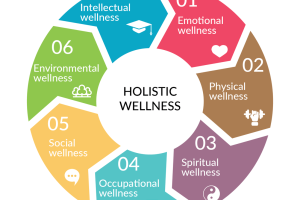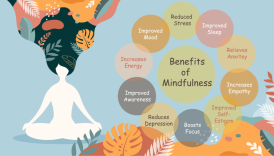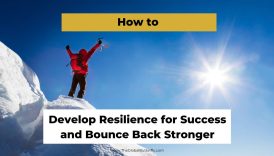Achieving Balance: A Holistic Approach to Your Healthy Life Program

Understanding the Concept of Holistic Health
Holistic health is an approach that considers the whole person—mind, body, and spirit—rather than merely focusing on symptoms or isolated problems. It emphasizes the interconnectedness of physical, mental, and emotional aspects of well-being. For instance, when Jane decided to start yoga, she quickly found that her anxiety levels decreased and her physical strength improved. This is a perfect illustration of how nurturing one aspect can benefit others. Key components of holistic health include:
- Achieving Balance: A Holistic Approach to Your Healthy Life Program
- Understanding the Concept of Holistic Health
- Importance of Achieving Balance in Life
- Physical Well-being
- The Role of Exercise in a Healthy Life Program
- Nutrition Tips for a Balanced Diet
- Mental Health
- Strategies for Stress Management
- Importance of Mental Well-being in Overall Health
- Emotional Wellness
- Cultivating Positive Relationships
- Practicing Self-care and Self-compassion
- Spiritual Connection
- Exploring Mindfulness and Meditation
- Finding Inner Peace and Purpose
- Work-life Balance
- Tips for Managing Work and Personal Life
- Setting Boundaries for a Healthy Balance
- Sleep and Relaxation
- Importance of Quality Sleep
- Relaxation Techniques for Stress Relief
- Physical well-being: Regular exercise and proper nutrition.
- Mental health: Strategies to manage stress and emotional challenges.
- Emotional wellness: Building positive relationships and practicing self-care.
- Spiritual connection: Finding purpose through mindfulness and meditation.
Importance of Achieving Balance in Life
Achieving balance in life is essential for overall well-being. Many people run their lives like a tightrope, teetering between work, personal obligations, and social activities, which can lead to stress and burnout. For example, Mark, a busy executive, learned the value of setting boundaries when he realized that all his working hours compromised his personal time and relationships. To create a balanced lifestyle, consider the following:
- Prioritize self-care: Make time for activities that rejuvenate you.
- Set realistic goals: Break tasks into manageable steps.
- Stay connected: Nurture relationships that fill you with joy.
In essence, a well-rounded approach to health and wellness is not just beneficial; it’s transformative.
Physical Well-being
The Role of Exercise in a Healthy Life Program
Exercise is a cornerstone of physical well-being, acting as a powerful tool in maintaining good health. Whether it’s a brisk walk in the park or a challenging weightlifting session, finding an activity that you enjoy can pave the way for a healthier lifestyle. Take Sarah, for example. After joining a local cycling group, she discovered not only a love for fitness but also a newfound circle of friends—all while improving her cardiovascular health. Incorporating exercise into your routine can lead to various benefits, including:
- Weight management: Helps regulate body weight and reduce the risk of obesity.
- Improved mood: Increases endorphin levels, leading to a natural boost in happiness.
- Enhanced energy: Regular physical activity can combat fatigue, making everyday tasks more manageable.
Nutrition Tips for a Balanced Diet
While exercise plays a vital role, nutrition is equally important in a healthy life program. Proper nutrition fuels the body, providing the energy necessary for daily activities and workouts. Consider these simple yet effective tips for a balanced diet:
- Eat a variety of foods: Incorporate fruits, vegetables, whole grains, and lean proteins to ensure a wide range of nutrients.
- Practice portion control: Be mindful of portion sizes to avoid overeating.
- Stay hydrated: Drink plenty of water throughout the day, aiming for at least eight glasses.
By combining exercise with a balanced diet, individuals set themselves up for long-term physical well-being, resulting in a happier, more energetic life.
Mental Health
Strategies for Stress Management
As we continue to explore the facets of well-being, mental health plays a crucial role in our overall health. Stress is an inevitable part of life, but how we manage it can make a significant difference in our mental clarity and emotional stability. For instance, when Tom faced a demanding work deadline, he found that implementing stress management techniques helped him maintain focus and composure. Some effective strategies for stress management include:
- Mindfulness and meditation: Taking a few moments to breathe deeply and focus can clear the mind.
- Physical activity: Engaging in regular exercise releases endorphins—those “feel-good” hormones that combat stress.
- Journaling: Writing down thoughts and feelings can provide an outlet for anxiety and help organize one’s mind.
Importance of Mental Well-being in Overall Health
Mental well-being is not just a component of health; it’s a foundation upon which physical and emotional wellness rests. When individuals neglect their mental health, they often see repercussions in other areas—like trouble sleeping or decreased immunity. Consider the following reasons why mental well-being is essential:
- Enhanced productivity: A clear mind improves focus, leading to better performance at work or school.
- Stronger relationships: Individuals with good mental health tend to cultivate healthier connections with others.
- Resilience: A well-maintained mental state allows individuals to bounce back from challenges more effectively.
By prioritizing mental health strategies, individuals can create a more balanced and fulfilling life.
Emotional Wellness
Cultivating Positive Relationships
Building and nurturing positive relationships is a fundamental aspect of emotional wellness. Healthy connections not only provide support during tough times but also enhance happiness and self-esteem. For example, when Lisa began spending more time with friends who lifted her spirits, she noticed a significant change in her outlook on life. To cultivate positive relationships, consider these tips:
- Be present: Make an effort to listen actively when engaging with others, showing that you value their thoughts and feelings.
- Express gratitude: Simple acknowledgments, like thanking someone for their support, can strengthen bonds.
- Engage in shared activities: Joining clubs or participating in hobbies with friends can create shared memories and deepen relationships.
Practicing Self-care and Self-compassion
Self-care and self-compassion are vital for maintaining emotional wellness. It’s easy to prioritize others’ needs over your own, but neglecting self-care can lead to burnout. Take Sarah, who found herself feeling overwhelmed by her responsibilities. Once she started dedicating time each week for herself, she felt reenergized and more effective in her roles. Here are some self-care strategies:
- Set aside “me time”: Block out time in your schedule to do things you love, whether that’s reading, exercising, or indulging in a hobby.
- Be kind to yourself: Treat yourself with the same compassion you would offer a friend. Acknowledge that it’s okay to make mistakes and learn from them.
- Limit negative influences: Surround yourself with positivity, be it through uplifting content or supportive people.
By fostering positive relationships and practicing self-care, individuals can create a robust foundation for emotional resilience, leading to a happier, more balanced life.
Spiritual Connection
Exploring Mindfulness and Meditation
Moving from emotional wellness, we arrive at the profound importance of spiritual connection in our lives. Spirituality, while unique for everyone, often involves practices that foster deeper awareness and connection with oneself and the universe. Mindfulness and meditation are powerful tools in this journey. For example, when Mark started a daily meditation practice, he found himself more grounded and present, significantly reducing feelings of anxiety. To explore mindfulness and meditation, consider the following approaches:
- Start simple: Dedicate just five minutes each day to sit in silence, focussing solely on your breath.
- Guided meditations: Use apps or online videos that can lead you through the process if you’re unsure where to begin.
- Incorporate mindfulness into daily activities: Whether eating, walking, or even washing dishes, focus on the sensations and experiences in the moment.
Finding Inner Peace and Purpose
Finding inner peace and purpose is often the ultimate goal of enhancing our spiritual connection. When individuals engage in practices that promote awareness, they can identify what truly matters to them. For instance, Helen discovered her passion for volunteering after reflecting on her values during her meditation sessions, leading her to a more fulfilling life. To cultivate inner peace and purpose:
- Reflect on your values: Make a list of what is most important to you and think about how you can align your actions with those values.
- Engage in nature: Spending time outdoors often brings a sense of tranquility that can help clear the mind.
- Practice gratitude: Regularly acknowledging what you appreciate in life can enhance your sense of fulfillment and connectedness.
By exploring mindfulness, meditation, and focusing on inner peace and purpose, individuals can deepen their spiritual connections, leading to a more enriched and meaningful life.
Work-life Balance
Tips for Managing Work and Personal Life
As we shift from exploring spiritual connection, it’s essential to discuss a critical aspect of overall wellness: work-life balance. In today’s fast-paced world, juggling professional responsibilities with personal life can quickly lead to stress and burnout. Effective management strategies can help individuals maintain harmony. For instance, Emily, a marketing manager, implemented a time-blocking method which transformed her productivity and allowed her to enjoy evenings with her family without distractions. Here are some tips for managing work and personal life:
- Prioritize tasks: Create a daily to-do list, highlighting the most critical tasks first.
- Employ a flexible schedule: If your job allows, try to adapt your hours to better fit your personal commitments.
- Utilize technology: Use apps for reminders and organization, ensuring you don’t miss important deadlines or family events.
Setting Boundaries for a Healthy Balance
Setting boundaries is fundamental in creating a work-life balance. It’s not uncommon for work to seep into personal time, especially with remote work becoming more prevalent. John, a software developer, found he was constantly “on-call,” leading to stress. By establishing firm boundaries, he learned to disconnect after work hours, which dramatically improved his mental health. To set effective boundaries:
- Designate work hours: Clearly define when your working time begins and ends, and communicate this to coworkers.
- Create a dedicated workspace: If possible, set up a specific area for work to physically separate it from your home life.
- Learn to say no: It’s okay to decline additional responsibilities that infringe on your personal time.
By implementing these strategies, individuals can cultivate a healthier balance between work and personal life, ultimately leading to a more fulfilling existence.
Sleep and Relaxation
Importance of Quality Sleep
Building upon the critical theme of work-life balance, we cannot overlook the impact of quality sleep and relaxation on overall well-being. Sleep is not merely a break from our daily lives; it’s a crucial period where the body repairs itself and the mind rejuvenates. For instance, when Laura began prioritizing her sleep schedule, she noticed increased focus and energy throughout her day. Here are some reasons why quality sleep is vital:
- Cognitive function: Adequate sleep enhances memory, problem-solving skills, and creativity.
- Emotional stability: Good sleep helps regulate mood, reducing the likelihood of anxiety and depression.
- Physical health: Sleep contributes to a robust immune system, aiding in fighting off illness.
To ensure you’re getting quality sleep, consider these tips:
- Establish a regular sleep schedule: Try to go to bed and wake up at the same time every day, even on weekends.
- Create a bedtime routine: Engaging in calming activities, like reading or listening to soft music, can signal your body that it’s time to wind down.
Relaxation Techniques for Stress Relief
Alongside quality sleep, relaxation techniques can significantly ease stress and enhance mental clarity. Many individuals, like James, have found peace through simple relaxation practices. After incorporating meditation and deep-breathing exercises into his evening routine, he reported a marked decrease in his stress levels. Effective relaxation techniques include:
- Deep breathing exercises: Inhale deeply through your nose, hold for a few seconds, then exhale slowly through your mouth. Repeat several times.
- Progressive muscle relaxation: Tense and then relax different muscle groups in your body, helping to release tension.
- Gentle yoga or stretching: Incorporating light stretches can also promote relaxation and prepare the body for sleep.
By focusing on the importance of quality sleep and integrating relaxation techniques, individuals can create a holistic approach to managing stress and nurturing their overall well-being.





